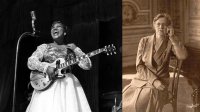Music History Lessons for Women’s History Month
During Women’s History Month, teachers can incorporate lessons on women who made a huge impact on music history but are often overlooked.
Your content has been saved!
Go to My Saved Content.A few weeks ago, a parent told me a story about her first-grade daughter’s experience learning about music history with her piano teacher. After an engaging conversation, the first grader noticed that they were only talking about men and responded, so there were a lot of barriers to women in music back then?
While not every first grader will realize it, it can be very easy to present music history in a way that is very male-dominated. Recognizing the inequalities that existed in the past and still exist today is an important first response, but we can also reflect on how we talk about music history (and history in general) to be able to bring attention to the major influence that women had.
A RELAY, NOT AN INDIVIDUAL RACE
When I was in middle school, I was part of a relay team that won the league championship. The race was the 4x400, in which each runner runs a lap around the track. The total distance is about a mile, run by four separate runners. Imagine coming to the track meet and seeing me finishing the relay race. If you saw me crossing the finish line by myself, you might not realize all the fast (and actually faster) runners that came before me.
This is what tends to happen when it comes to music, arts, and even scientific and technological advancements. It’s easy to see the last part of the accomplishment and forget that it was a relay, not a solo race.
Many times in music and the arts, the “genius” work of an individual downplays the cultural and historical context that is passed on from one performer to another. The person finishing the race is one who is able to popularize and often monetize the work or style. This person typically has gender, racial, social, cultural, and even financial advantages that make this possible. In music, the longest legacies are those of composer/writers, then performers, then perhaps conductors, then a steep drop-off to the many other baton holders in the race.
By deliberately focusing on roles that are not as monetized and popularized, we allow students to see a wider range of musicians in periods of time and genres where women and other groups were typically not well known. Let’s consider examples of two women who changed music forever. You might not have heard of them because their significant contributions were overshadowed by more popular artists. These women had an arguably larger effect on music than Bach, Beethoven, Elvis, or the Beatles, but their roles weren’t as the superstar performer/composer.
NADIA BOULANGER
One of the roles that opened to women relatively early in music was that of music teacher. Nadia Boulanger was a French conductor and composer who was arguably the world’s most influential music teacher. Young adult composers, mostly male, many of whom had already reached a degree of notoriety, came to Paris to work with her and elevate their writing.
It’s hard to overestimate the cumulative effect of Boulanger’s teaching. Most of the 20th century’s most famous art music composers studied with her: Aaron Copland, Virgil Thomson, Elliott Carter, and Quincy Jones, to name just a few. While Igor Stravinsky wasn’t specifically a student of hers, she was an important guide in his career as well. Being under Boulanger’s tutelage was much more than a résumé requirement; while she had a very specific idea about music, she pushed her students in many different directions with her influence—extending from the neoclassical work of Stravinsky to the minimalism of Philip Glass to the “legitimization” of the tango with Astor Piazzolla.
Vermont Public Classical’s Timeline podcast produced an informative piece about Boulanger’s work. The brief episode provides a good introduction for students to learn about Boulanger’s legacy.
SISTER ROSETTA THARPE
Sister Rosetta Tharpe was a rock star before rock and roll even existed. One of the clearest examples of her influence is that when she was touring in England late in her life, critics complained that she had stolen her dance moves from Elvis Presley—unaware that she’d been doing the moves long before Elvis. He essentially took them from her.
At the height of her popularity, Tharpe might have been seen not as one of the background players in music, but right at the center. She released music for four decades (1930s–1960s), collaborated with many notable musicians, played to integrated audiences in a time of segregation, and fused gospel and popular music together. Only the superstardom of later rock-and-roll acts (who clearly demonstrate her influence) confirmed that she was a pioneer of the genre.
Her legacy was rekindled in 2019 when Lizzo’s guitarist on Saturday Night Live paid tribute to Tharpe in her performance, playing the same type of guitar that Tharpe had favored. In an article for NPR Music, Jessica Diaz-Hurtado delves into Sister Rosetta Tharpe’s career as a fearless artist. The podcast Black History Moments offers an episode that gives further insight into Tharpe’s work and is another helpful resource to share with students.
It’s a much easier process today to uncover lesser-known and groundbreaking artists from the past than it was 20 or even 10 years ago (due to the high level of information available on the internet). Tracing influential musicians, as well as their friends and coworkers, can become an exciting treasure hunt. Music is and has always been a social pursuit that does not happen in isolation. This kind of treasure hunting would make a great multi-grade project for middle or high school students to present to elementary students.
